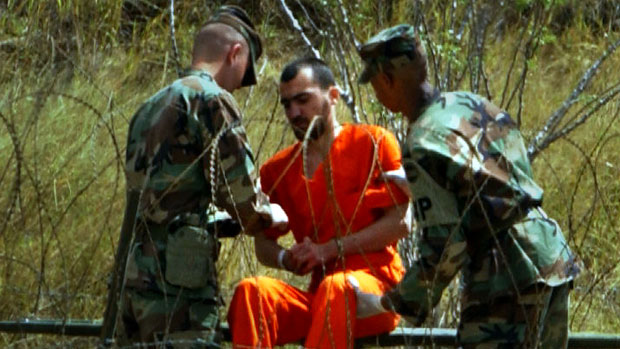CIA torture report: US braces for international backlash
Report due to expose sexual threats and other brutal techniques used against terror suspects

A free daily email with the biggest news stories of the day – and the best features from TheWeek.com
You are now subscribed
Your newsletter sign-up was successful
American embassies around the world are preparing for a backlash as the US Senate releases a report into the CIA's brutal interrogation of terror suspects after the 9/11 attacks.
Despite heavy redactions, the long-delayed report is expected to be a damning indictment of a secret programme in which around 100 terror suspects were detained between 2001 and 2009.
The 'Rendition, Detention and Interrogation' programme was authorised by George W Bush after the terror attacks on 11 September 2001.
The Week
Escape your echo chamber. Get the facts behind the news, plus analysis from multiple perspectives.

Sign up for The Week's Free Newsletters
From our morning news briefing to a weekly Good News Newsletter, get the best of The Week delivered directly to your inbox.
From our morning news briefing to a weekly Good News Newsletter, get the best of The Week delivered directly to your inbox.
Sources familiar with the document told Reuters that the report includes graphic details about sexual threats and other harsh interrogation techniques used against militants.
One senior al-Qaeda operative – suspected of masterminding the suicide attack against US Navy missile destroyer USS Cole that killed 17 sailors in 2000 – was apparently threatened with a buzzing power drill, although it was never actually used against him.
At least one other detainee was sexually threatened with a broomstick, the sources said. Other suspects were interrogated using methods such as waterboarding, slapping, humiliation, exposure to cold, and sleep deprivation.
The Justice Department had authorised some techniques, such as sleep deprivation, but the report is likely to show that controls and supervision were sometimes lax when the spy agency began interrogating militants in August 2002.
A free daily email with the biggest news stories of the day – and the best features from TheWeek.com
Bush ended many aspects of the programme before leaving office, and Obama banned the programme when he took office in 2009, acknowledging that some of the methods amounted to torture.
This week the US has stepped up security at its facilities worldwide, fearing the possibility of a violent response to the report overseas. The Pentagon has reportedly warned field commanders they should take appropriate steps to protect US troops and bases abroad.
The report, which took years to produce, is set to conclude that the harsh interrogations did not produce any critical intelligence that would not have been obtained through less brutal measures.
However, this is disputed by many intelligence and counter-terrorism officials.
Publication of the report was delayed because of disagreements in Washington over what should be made public. The Senate Intelligence Committee, which has a majority of Democrats, has produced a 6,000-page report, but only a 480-page summary will be published. Republicans on the committee are due to publish a separate report.
-
 James Van Der Beek obituary: fresh-faced Dawson’s Creek star
James Van Der Beek obituary: fresh-faced Dawson’s Creek starIn The Spotlight Van Der Beek fronted one of the most successful teen dramas of the 90s – but his Dawson fame proved a double-edged sword
-
 Is Andrew’s arrest the end for the monarchy?
Is Andrew’s arrest the end for the monarchy?Today's Big Question The King has distanced the Royal Family from his disgraced brother but a ‘fit of revolutionary disgust’ could still wipe them out
-
 Quiz of The Week: 14 – 20 February
Quiz of The Week: 14 – 20 FebruaryQuiz Have you been paying attention to The Week’s news?
-
 Home Office worker accused of spiking mistress’s drink with abortion drug
Home Office worker accused of spiking mistress’s drink with abortion drugSpeed Read Darren Burke had failed to convince his girlfriend to terminate pregnancy
-
 In hock to Moscow: exploring Germany’s woeful energy policy
In hock to Moscow: exploring Germany’s woeful energy policySpeed Read Don’t expect Berlin to wean itself off Russian gas any time soon
-
 Were Covid restrictions dropped too soon?
Were Covid restrictions dropped too soon?Speed Read ‘Living with Covid’ is already proving problematic – just look at the travel chaos this week
-
 Inclusive Britain: a new strategy for tackling racism in the UK
Inclusive Britain: a new strategy for tackling racism in the UKSpeed Read Government has revealed action plan setting out 74 steps that ministers will take
-
 Sandy Hook families vs. Remington: a small victory over the gunmakers
Sandy Hook families vs. Remington: a small victory over the gunmakersSpeed Read Last week the families settled a lawsuit for $73m against the manufacturer
-
 Farmers vs. walkers: the battle over ‘Britain’s green and pleasant land’
Farmers vs. walkers: the battle over ‘Britain’s green and pleasant land’Speed Read Updated Countryside Code tells farmers: ‘be nice, say hello, share the space’
-
 Motherhood: why are we putting it off?
Motherhood: why are we putting it off?Speed Read Stats show around 50% of women in England and Wales now don’t have children by 30
-
 Anti-Semitism in America: a case of double standards?
Anti-Semitism in America: a case of double standards?Speed Read Officials were strikingly reluctant to link Texas synagogue attack to anti-Semitism